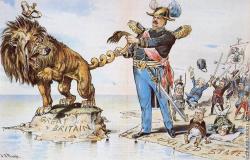Yes to US security, no to Russian security?

Two centuries ago, Washington warned European powers, primarily the British Empire, against undermining its security throughout the Americas, from Canada to Patagonia. Thus, the Monroe Doctrine was born. Russia seeks to do the same thing, but on a smaller scale, in former Soviet space.
Political leaders present their publics with narratives which justify what they are doing or intend to do. A crucial decision in constructing such narratives is when to start the clock. In conflict situations each side normally starts the clock with the enemy making an apparently unprovoked attack. Each side claims to be innocent, and seeks to show the enemy as the unprovoked aggressor.
In the case of Russia’s invasion first of Crimea in 2014 and then much of eastern Ukraine in 2022, the standard western narrative -- from political leaders and media such as the Financial Times, the New York Times, the BBC -- starts the clock with Russia’s actions, presented as an unprovoked attack on innocent and unified Ukraine, which was exercising its sovereign right to forge a stable and European democracy on Russia’s doorstep, including to join both the European Union and NATO. Western democracies, notably the US and the UK, came in strongly to support the government and population seeking to exercise this sovereign right of a flourishing democracy.
The Russian narrative, or rather that of the community of Russians wanting to keep the West at arms’ length which now controls the Russian state under Putin, starts the clock at least as far back as the Second World War, when Germany and its allies killed some 8-9 million soldiers and another 16-17 million civilians. It remains an issue of deep resentment in the Russian elite to this day that western states and media largely ignore the vital Russian role in the defeat of Nazi Germany.
The Second World War experience fortified the conviction that Russia must have a buffer zone around its borders, especially its western borders, where Russia has substantial control and potentially hostile states do not; including unimpeded access to Sebastopol in Crimea, Russia’s only ice-free port, a critical security concern.
Russia’s leaders have said repeatedly since the breakup of the Soviet Union that they will resist allowing a rival great power to incorporate a state on their doorstep into a hostile military alliance. They are in effect applying the US’s Monroe Doctrine to their own “near-abroad”. The US would not tolerate Mexico or Canada making a military alliance with China or Russia. Russia’s resistance to Ukraine and Georgia joining NATO follows the same logic.
In early 2008, US Ambassador to Moscow William Burns sent a cable to Secretary of State Condoleeza Rice, with the unusual title, “NYET MEANS NYET: RUSSIA’S NATO ENLARGEMENT RED LINES”. He explained that “Ukrainian entry into NATO is the brightest of all redlines for the Russian elite.” The cable received no reply. Two months later, at their summit in Bucharest, NATO leaders issued a formal declaration, “Georgia and Ukraine will be in NATO” (Binney 2014.
Meanwhile the US foreign policy establishment had long considered Ukraine to be a “geopolitical pivot” in its drive to subordinate Russia and secure US primacy over the whole of Eurasia. Zbigniew Brzezinski, who had been President Carter’s national security advisor (born in Warsaw to a family from a territory incorporated into Ukraine in 1945), said in his 1997 book The Grand Chessboard: American Primacy and Its Geopolitical Imperatives:
“Ukraine, a new and important space on the Eurasian chessboard, is a geopolitical pivot because its very existence as an independent country helps to transform Russia.” He explained that Ukraine integrated into or closely allied to Europe would leave Russia as a “predominantly Asian imperial state”; whereas Ukraine integrated into Russia gave Russia the opening to be (or resume being) “a Eurasian empire”.
So, the long-held US aim has been to push Ukraine away from Russia as a major step towards constraining Russian influence strategy, and more distantly Chinese influence strategy too, thereby sustaining US primacy across Eurasia.
In 2013 Carl Gershman, director of the National Endowment for Democracy (NED), said:
“Ukraine is the biggest prize.” If it could be pulled away from Russia and into the West, “Putin may find himself on the losing end not just in the near abroad but within Russia itself” (note the hint of regime change). (Gershman 2013)
Russia invaded Crimea in February 2014. War broke out between Russian separatist groups in Donbas (supported by Russian regular troops) and Ukrainian forces in April 2014. A peace agreement was negotiated, mediated by leaders of France and Germany, signed in February 2015 (Minsk II). It was never fully implemented, the fighting subsided but did not end.
Fast forward to 19 February 2022. Ukrainian President Zelensky gave an impassioned speech at the Munich Security Conference. He insisted that Ukraine must have a clear path to join NATO and regretted that Ukraine had given up its nuclear arsenal at the end of the Soviet Union, which was then the world’s third biggest nuclear arsenal.
As reported by observers of the OSCE (Organization for Security and Cooperation in Europe), just at this time in February 2022 the Ukrainian military dramatically increased its shelling of the Russian-speaking and Russian Orthodox-believing Donbas region of eastern Ukraine (where referendums in 2014 were claimed to have supported independence from Ukraine). (Reuters 2022). This attack would not have occurred without the blessing of the US and NATO. The OSCE reported that around 14,000 people had been killed in the Donbas by the shelling.
The Ukrainian military attack on Donbas gave Putin his casus belli. The military invaded on 24 February 2022. At first it seemed as though he wanted to make a blitzkrieg attack on Kyiv, overthrow the democratically elected government of Zelensky, and install a government that would do the Kremlin’s bidding. It became clear within days that this was not going to work.
Putin’s action played into the West’s trap, as sketched long ago by Brzezinski and several others, the strategy for regime change in Moscow. It has three main elements:
First, actions by Ukraine, the US and NATO which prompt the Kremlin to order an invasion. Second, sufficient military and other equipment to Ukraine to bog the Russian military in a quagmire in Ukraine – akin to the US quagmire in Vietnam and to the Soviet army quagmire in Afghanistan (which in the view of US military leaders had contributed substantially to the implosion of the Soviet Union). Third, severe, far-reaching sanctions on Russia to cause major disruption to the Russian elite and severe contraction of living conditions for the Russian middle-class. The strategy should last long enough that Russians rise up to overthrow Putin and install a government more sympathetic to the West. As President Biden declared on 26 March 2022, in Warsaw, “For God’s sake, this man [Putin] cannot remain in power.” And of course, the West and NATO would not commit troops to the fight, which would cause upheaval at home. The fighting would be for Ukrainians, till the last Ukrainian.
The first step was to lure the Kremlin into a sizable invasion of Ukraine.
But regime change in Moscow is a long-term US and NATO objective. The more immediate objective is to invoke Russia as an existential enemy, to provide glue for cooperation between the West’s often fractious member states under US leadership. To justify US primacy, to present a unitary front in NATO, to justify big increases in western military budgets, Russia must be presented as the common enemy which aims to sweep across much of eastern Europe once it conquers Ukraine.
Western military firms need the West to believe it faces existential enemies in the form of major states -- not just slippery “terrorists” or “a bunch of midgets”, as Chairman of the Joint Chiefs of Staff General Martin Dempsey labelled the Islamic State. The share prices of the major US arms manufactures shot up as the Russian invasion looked likely.
The key point was made by Georgi Arbatov, a political scientist and advisor to Gorbachev and other secretaries of the Communist Party, and founder and director of the Institute for US and Canada at the Russian Academy of Science. He said to a group of senior US officials in 1987: "We are going to do a terrible thing to you – we are going to deprive you of an enemy." (Wheeler 2018)
This is how one can understand the West’s persistent rebuff to efforts of Gorbachev, Yeltsin and early Putin to establish non-adversarial relations with western states. The West needs Russia as an enemy to provide force for compromise between often fractious western states.
No surprise that alarm bells rang in western capitals when it became known that within days of Russia’s invasion, peace negotiations got underway between Russian and Ukrainian delegations under Belarus and then Turkish mediation and continued through March and April 2022. Both sides made statements that agreement was near, including on Russia’s red line that Ukraine does not join NATO and that Ukraine hold military drills with foreign military participation only after agreement with “guarantor states” among which would be Russia – making Ukraine a genuinely neutral state in-between Russia and the West (wbur 2024).
But Ukraine then advanced a treaty text which would require western states to come to Ukraine’s aid with a bigger commitment than even article 5 of NATO – without exploring the commitment with the US and NATO, a commitment that might bring the US into direct conflict with Russia. No surprise that the US did not want a peace agreement that included this text. Then came the revelations of the Russian military’s atrocities in Bucha, March 2022, including mass murder and rape, which stiffened Ukrainian determination and western determination to fight towards victory over Russia.
The West is playing a double longer term game, because it also wants Russia to be a deferential cooperative partner, especially as China grows stronger. The last thing it wants is a China-Russia axis. Yet, ironically, this has been the result so far. Russia now fills China’s strategic gaps in food, energy, strategic raw materials. It makes China stronger, which accelerates the end of American primacy over Eurasia.
Meanwhile, the war has strengthened US primacy over Western Europe, as seen in NATO’s dependence on American armaments and in American fossil fuel companies’ giant profits from the cut-off of Russian oil to Europe.
The war endgame has somehow to resolve Ukraine’s existential need not to face again a situation where its population is fighting by itself if Russia invades. And resolve Russia’s existential need not to face a hostile western military alliance and western troops right on its border, just as the US would not tolerate a hostile Russia-China-Mexico alliance on its border. As though this is not difficult enough, the endgame must also build Ukrainian constitutional protections to the large minority of the population who before 2014 were Russian speaking and Russian-Orthodox believing and who since 2014 have been systematically discriminated against (Wade 2015).
Professor Robert Wade is Professor of Global Political Economy at the LSE.
Image: By J. S. Pughe - Puck Magazine, Public Domain
References
Binney, William, 2014, “Ex-NSA and intelligence veterans warn Merkel on U.S. lies concerning 'Russian invasion' of Ukraine”. http://www.sott.net/article/284924-Ex-NSA-and-intelligence-veterans-warn-Merkel-on-US-lies-concerning-Russian-invasion-of-Ukraine
Gershman, C. 2013 “Former Soviet states stand up to Russia. Will the US?”, Washington Post September 26
Reuters, 2022 “OSCE reports surge in number of explosions in eastern Ukraine”, February 19
Wade, Robert H., 2003, “The invisible hand of the American empire”, Ethics and International Affairs, 17 (1).
Wade, Robert H., 2013, “Protecting power: western states in global organizations”, in David Held and Charles Roger (eds), Global Governance at Risk, Polity.
Wade, Robert H., 2015, “Reinterpreting the Ukraine conflict: the drive for ethnic subordination and existential enemies”, Challenge, July/August 2015, http://www.tandfonline.com/doi/full/10.1080/05775132.2015.1054700
Wade, Robert H. 2022a, “Why the Kremlin has long wanted to annex Ukraine, and why the US has long wanted to get Russia trapped in a Ukraine quagmire” , Global Policy, https://www.globalpolicyjournal.com/blog/30/03/2022/why-us-and-nato-have-long-wanted-russia-attack-ukraine
Wade, Robert H., 2022b, “A ‘diplomatic solution’ to the Ukraine crisis ”, Global Policy, 2 March 2022,
https://www.globalpolicyjournal.com/blog/01/03/2022/diplomatic-solution-ukraine-crisis
wbur, 2024, “The story behind 2022’s secret Ukraine-Russia peace negotiations”, May 6
Wheeler, N. 2018, Trusting Enemies: Interpersonal Relationships in International Conflict, chapter 5, Oxford University Press


